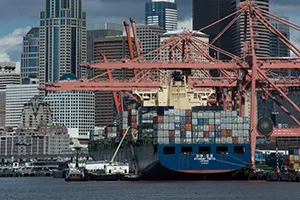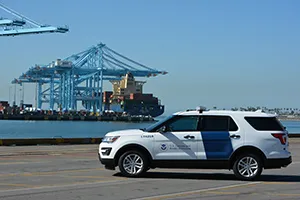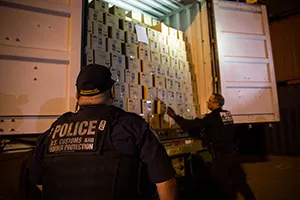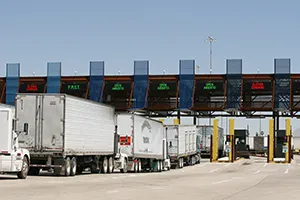
trade during the coronavirus pandemic. Above, a
container ship is docked at the port of Seattle in
Washington state.
Photo by Jerry Glaser, CBP file photo
As the first days of summer began to unfold, the 15th term of Customs and Border Protection’s trade advisory committee came to a close. Members of the Commercial Customs Operations Advisory Committee, known as COAC, convened virtually for their last public meeting on June 23, signaling a time of endings and new beginnings.
“This is the final meeting of the 15th COAC and there are 12 of us who will be jumping off and handing the baton to the next team for the 16th term,” said Lenny Feldman, one of the COAC trade co-chairs and a senior member of the Sandler, Travis, & Rosenberg law firm. “We’ve been at this for six years, which really is unprecedented. The Trade Facilitation and Trade Enforcement Act gave the option of extending the terms for COAC members from two to three years, and we were blessed to have the opportunity to serve since April 2015.”
CBP Acting Commissioner Troy A. Miller recognized the 12 COAC members. “I thank you for your service and dedication to COAC. Your commitment to achieve the high levels of collaboration between CBP and the trade community is what makes this committee so valuable to us,” said Miller, who hosted and co-chaired the public gathering. “This is not goodbye. We will count on your expertise as we transition the new group of committee members.”
The 12 COAC members whose service concluded at the end of the 15th term include Lenny Feldman; Cindy Allen, vice president of regulatory affairs and compliance for FedEx Trade Networks; Brenda Barnes, export manager for Geo. S. Bush & Co.; Heidi Bray, manager of U.S. and global customs compliance for Stellantis; Celeste Catano, global product manager for customs management at BluJay Solutions; Lisa Gelsomino, president and CEO of Avalon Risk Management; Alexandra Latham, director of customs compliance for Costco Wholesale Corporation; Amy Magnus, director of customs affairs and compliance at A.N. Deringer; Madeleine Veigel, director of customs for The Americas at Expeditors International of Washington; Kate Weiner, director of global customs regulatory affairs at Cargill; Michael White, president of Cargo Network Services Corp.; and Michael Young, vice president of business process and system for OOCL.
Miller also shared in his opening remarks that CBP Deputy Commissioner Robert E. Perez would be retiring from public service at the end of June. Perez, who served almost 29 years with U.S. Customs and Border Protection and its legacy agency, the U.S. Customs Service, addressed the virtual audience with heartfelt emotion. “I can’t tell you how fortunate and blessed I feel to have had opportunities to know so many of you and to bear witness to the incredible capability of everyone involved in this committee both on the government and private sector sides,” said Perez.

a docked vessel at the port of Los Angeles-Long Beach
in California, the busiest cargo seaport in the nation.
Photo by Jose Teran
Perez added, on a reflective note, “… the COAC has proven over the years that when the entirety of this group, those of us on the government side and those on the private sector side, roll up our sleeves in earnest and tackle issues together with the utmost transparency, the utmost collaboration, and the utmost spirit of partnership and cooperation, there is nothing we can’t get done. And some of the things that do get done are, frankly, nothing less than spectacular. So, I encourage you all to carry on this incredible work.”
Miller also welcomed AnnMarie Highsmith as the new executive assistant commissioner of CBP’s Office of Trade. Highsmith joined the U.S. Customs Service as a staff attorney in 1992, at the start of her legal career. She later served as CBP’s associate chief counsel for trade and finance, and was the principal legal advisor for CBP on all matters involving customs laws and their impact on trade. Highsmith was then promoted to the position of deputy chief counsel for CBP. “We are lucky to have someone of your expertise leading our trade efforts,” said Miller. “It’s safe to say, the Office of Trade continues to be in good hands.”
Highsmith greeted those attending and emphasized the importance of partnering with the trade community. “I understand how extremely crucial our partnerships are with the private sector, and I’m grateful to all of you for your commitment to working with us. These partnerships will be more valuable than ever as we move forward in turning the 21st Century Customs Framework from a vision into a reality,” said Highsmith. “We will continue to seek your input on our e-commerce data pilot, our forced labor enforcement, and other key issues. We simply cannot carry out our central mission to safeguard U.S. trade or realize our 21st century vision without your help. I look forward to working with you all in the coming days.”
Miller also spoke about forced labor, one of CBP’s priorities. He noted CBP announced its withhold release order on seafood from the Dalian Ocean Fishing Company on May 28. “Our investigation turned up all 11 forced labor indicators including physical violence against fishers, abusive living and working conditions, withholding of wages, and debt bondage,” said Miller, underscoring that this is just the latest enforcement action CBP has taken to combat forced labor. “We’re currently enforcing 48 withhold release orders and eight active forced labor findings. The message that we’re going to continue to push out is that we will not tolerate forced labor in our supply chains.”

inspection of a shipping container at the port of
Long Beach in California.
Photo by Vincent Vuong
Another priority Miller discussed was protecting intellectual property rights. “On May 26th, we announced a new partnership with the U.S. Chamber of Commerce,” said Miller. “We’ll work to expand information sharing about known and suspected IPR violations, giving CBP more visibility into supply chains. We can then better target and interdict counterfeit and pirated goods.”
Miller capped off his remarks by adding, “Trade is the top priority for me as acting commissioner. We cannot be successful at facilitating lawful trade and travel without the input and expertise of industry. I appreciate every opportunity to engage with the trade community.”
The meeting, which also was co-chaired by Timothy Skud, the U.S. Department of Treasury’s deputy assistant secretary of tax, trade, and tariff policy, included updates on trade programs and COAC subcommittee work. Among the many topics discussed was export modernization. A white paper intended to serve as a strategic roadmap for 21st century export processing was presented by the COAC’s Export Modernization Working Group. “We’re very humbled to be able to present the accumulated work of the 12th, 13th, 14th, and 15th COACs in this white paper. A lot of brilliant export minds and talent have contributed to this body of work,” said COAC member Kate Weiner. “I know we can all agree how important exports are to our economy. Exporters continue to face struggles all over the world in exporting our products whether it’s transportation-related issues or protection of policies in an ever-increasing managed trade environment. Modernizing and increasing our focus on trade facilitation where we can is critical to growing our economy and protecting jobs that depend on exports.”
The white paper struck a positive chord. “We are very much supportive of the recommendations in this white paper—the guidance with respect to a progressive filing framework, having operationally feasible deadlines, a mutually supportive approach to inspections, a rational approach to penalties, and required changes for foreign trade regulations and customs regulations,” said Thomas Overacker, CBP’s executive director of cargo and conveyance security. “From a CBP perspective, we look forward to implementing this.”

during the COVID-19 pandemic. Above, cargo traffic
arriving from Mexico at the Mariposa Crossing at
the port of Nogales in Arizona.
Photo by Jerry Glaser, CBP file photo
The newly created 21st Century Customs Framework Task Force also was discussed at the meeting. Launched in April, the task force is a joint government/industry group that will help refine and advance the transformational reforms needed to bring U.S. trade into the 21st century. The 21st Century Customs Framework initiative is the most significant U.S. trade modernization effort since the Customs Modernization Act in 1993.
“Trade today, obviously, is not what it was 28 years ago. It has transformed dramatically, and it’s in many ways a much higher risk environment than it was in the early 1990s,” said Garrett Wright, the director of CBP’s Trade Modernization Office. “That’s in part due to substantially higher trade volumes brought on by e-commerce and online shopping. It’s also in part due to increasingly complex supply chains and new and emerging actors, many of whom we simply do not see. They and the global supply chains they operate within are outside of our purview in a lot of cases, and those unknowns translate to risk for the agency, our trade partners, and U.S. interests and equities.”
Trade co-chair Lenny Feldman gave a brief overview on behalf of COAC of the task force’s progress and encouraged the government and trade community to work together. “Now more than ever collaboration is critical in this changing trade environment,” said Feldman, who concluded his remarks with the hope that together the public and private sectors would “seize this opportunity to transform trade before trade transforms us.”
COAC trade co-chair Brian White, the vice president of compliance at The J.M. Smucker Company, echoed Feldman’s sentiments. “We can only truly achieve a 21st century customs and trade framework if all of the relevant stakeholders are fully engaged and committed to achieving a collective vision that delivers value for the public and private sectors.”
At the meeting, nine recommendations were presented and unanimously passed. Four of the recommendations pertained to export modernization. The remaining five recommendations focused on e-bonds.
Announcements were made regarding the next COAC meeting, which will be held on September 22, 2021, as well as CBP’s 2021 Virtual Trade Week, slated for July 20-22.
COAC is a 20-member advisory committee that was established by Congress in 1987. The committee provides advice and recommendations to CBP and the Department of the Treasury on the commercial operations of CBP and trade-related interdepartmental functions. Some of the issues that COAC focuses on include enhanced border and supply chain security, international efforts to harmonize customs practices and procedures, import safety, compliance, and modernization and automation processes used to facilitate trade.

